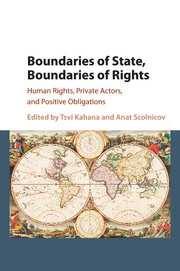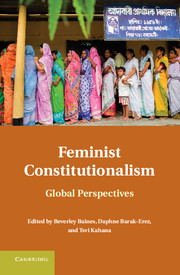35 results
Dedication
-
- Book:
- Boundaries of State, Boundaries of Rights
- Published online:
- 05 September 2016
- Print publication:
- 20 October 2016, pp v-vi
-
- Chapter
- Export citation
Copyright page
-
- Book:
- Boundaries of State, Boundaries of Rights
- Published online:
- 05 September 2016
- Print publication:
- 20 October 2016, pp iv-iv
-
- Chapter
- Export citation
Contributors
-
- Book:
- Boundaries of State, Boundaries of Rights
- Published online:
- 05 September 2016
- Print publication:
- 20 October 2016, pp ix-x
-
- Chapter
- Export citation
Bibliography
-
- Book:
- Boundaries of State, Boundaries of Rights
- Published online:
- 05 September 2016
- Print publication:
- 20 October 2016, pp 290-323
-
- Chapter
- Export citation
Index
-
- Book:
- Boundaries of State, Boundaries of Rights
- Published online:
- 05 September 2016
- Print publication:
- 20 October 2016, pp 324-330
-
- Chapter
- Export citation
Introduction
-
- Book:
- Boundaries of State, Boundaries of Rights
- Published online:
- 05 September 2016
- Print publication:
- 20 October 2016, pp 1-5
-
- Chapter
- Export citation
8 - Hybrid state accountability and hybrid rights
-
-
- Book:
- Boundaries of State, Boundaries of Rights
- Published online:
- 05 September 2016
- Print publication:
- 20 October 2016, pp 173-193
-
- Chapter
- Export citation
Contents
-
- Book:
- Boundaries of State, Boundaries of Rights
- Published online:
- 05 September 2016
- Print publication:
- 20 October 2016, pp vii-viii
-
- Chapter
- Export citation

Boundaries of State, Boundaries of Rights
- Human Rights, Private Actors, and Positive Obligations
-
- Published online:
- 05 September 2016
- Print publication:
- 20 October 2016
Index
-
- Book:
- Feminist Constitutionalism
- Published online:
- 05 June 2012
- Print publication:
- 16 April 2012, pp 475-477
-
- Chapter
- Export citation
Part V - Women's Rights, Multiculturalism, and Diversity
-
- Book:
- Feminist Constitutionalism
- Published online:
- 05 June 2012
- Print publication:
- 16 April 2012, pp 315-316
-
- Chapter
- Export citation
Contributors
-
- Book:
- Feminist Constitutionalism
- Published online:
- 05 June 2012
- Print publication:
- 16 April 2012, pp xiii-xvi
-
- Chapter
- Export citation
Part III - Feminism, Democracy, and Political Participation
-
- Book:
- Feminist Constitutionalism
- Published online:
- 05 June 2012
- Print publication:
- 16 April 2012, pp 167-168
-
- Chapter
- Export citation

Feminist Constitutionalism
- Global Perspectives
-
- Published online:
- 05 June 2012
- Print publication:
- 16 April 2012
Part II - Feminism and Judging
-
- Book:
- Feminist Constitutionalism
- Published online:
- 05 June 2012
- Print publication:
- 16 April 2012, pp 83-84
-
- Chapter
- Export citation
Part IV - The Constitutionalism of Reproductive Rights
-
- Book:
- Feminist Constitutionalism
- Published online:
- 05 June 2012
- Print publication:
- 16 April 2012, pp 261-262
-
- Chapter
- Export citation
13 - The Promise of Democratic Constitutionalism
-
-
- Book:
- Feminist Constitutionalism
- Published online:
- 05 June 2012
- Print publication:
- 16 April 2012, pp 240-260
-
- Chapter
- Export citation
Contents
-
- Book:
- Feminist Constitutionalism
- Published online:
- 05 June 2012
- Print publication:
- 16 April 2012, pp v-viii
-
- Chapter
- Export citation
Part I - Feminism as a Challenge to Constitutional Theory
-
- Book:
- Feminist Constitutionalism
- Published online:
- 05 June 2012
- Print publication:
- 16 April 2012, pp 13-14
-
- Chapter
- Export citation
Frontmatter
-
- Book:
- Feminist Constitutionalism
- Published online:
- 05 June 2012
- Print publication:
- 16 April 2012, pp i-iv
-
- Chapter
- Export citation



